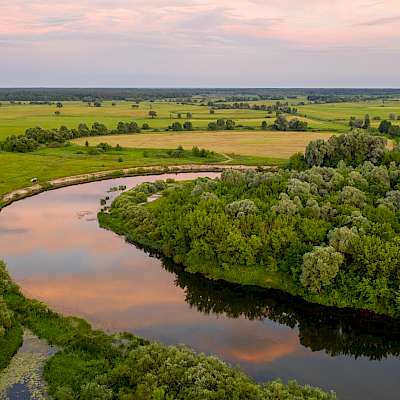Rivers and streams are the blue arteries of our landscape. The freshwater that flows through them is the lifeblood that sustains our food and farming system, pumping the soils in our fields with nutrients to grow crops and feed grazing cattle.
Our waterways also provide a rich food source and shelter for an abundance of wildlife like otters, kingfishers and heron.
River health is in decline
The state of our waterways is in decline. Last year, the Environment Agency found that no English river was in good health. According to the Wildlife Trusts, we’ve lost 90% of our wetland habitats in the last 100 years and over 10% of our freshwater and wetland species are threatened with extinction.
Agriculture is highly dependent on freshwater. Simultaneously, the sector is a major contributor to water scarcity and water pollution due to large-scale industrial farming and unsustainable practices. Agricultural run-off from pesticides and fertilisers sprayed on crops ends up in the soil, filtering down into our rivers - affecting not just the local environment, but also marine life when it reaches the ocean.
The River Wye is a recent example of rising phosphate, nitrogen and ammonia pollution levels, which is causing damage to the waterway and surrounding wildlife habitats. Wales Environmental Link (Wel) points toward intensive chicken and pig farming, inefficient storage and spreading of manures, slurries and fertilisers as the main causes.
Against the growing threat of climate change we also need to manage this finite, irreplaceable resource through climate-friendly farming to ensure food and nutrition security.
Protecting our waterways with climate and nature-friendly farming
By producing food in a more sustainable way, farmers can protect our rivers for generations to come. Better meat and dairy comes from farms that take a holistic approach, addressing 8 key impact areas from the way in which the animal is reared and fed, to limiting the use of antibiotics, tackling GHG emissions and nature loss, minimising pollution, water scarcity and run-off and improving soil health.
The Sourcing Better guide, produced by the Eating Better alliance, provides key guidance on farming outcomes and indicators to address these impact areas. In doing so, farmers can not only produce better meat and dairy but as custodians of the land, they can also bring benefits to our rivers and streams.
Soil health
Maintaining good soil health is vitally important in the fight against climate change. According to the Environment Agency, “UK soil contains about 10 billion tonnes of carbon, roughly equal to 80 years of annual greenhouse gas emissions” but intensive agriculture is causing arable soils to lose 40-60% of their organic carbon. Steps farmers take to minimise soil carbon loss bring both environmental and economic gains as climate change brings warmer, wetter weather which contributes to soil erosion and heightens flood risks.
Local Pollution
To stabilise soils and reduce runoff, farmers can plant trees and shrubs in fields. This better protects rivers from contaminants in runoff and it also attracts wildlife like bees and butterflies who are an essential part of our food system. Reducing or eliminating the use of harmful pesticides protects river health, allowing aquatic-life to thrive.
Farmers producing better meat and dairy raise fewer animals, with a focus on quality rather than quantity, minimising toxic elements in the local environment, reducing soil, air and water pollution.
Water scarcity
Climate-friendly farming uses good water management practices; capturing water from shed roofs to use in water troughs instead of removing resources from local rivers, for example. Responsible use of groundwater for crop irrigation avoids the risk of them being drained dry.
Better meat and dairy for the health of the planet
Water scarcity, local pollution and soil health are some of the impact areas covered in the Eating Better alliance's Sourcing Better guide. Each impact area addresses water in various ways and can be used by supermarkets and the food service sector to ensure they are sourcing better meat and dairy.
Download the full Sourcing Better guide here
